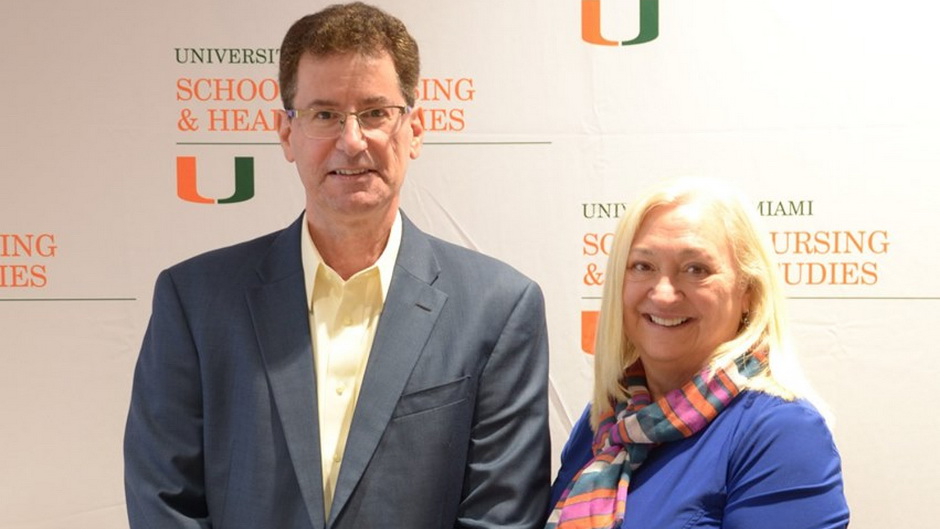Diagnosed with post-traumatic stress disorder, Afghanistan War veteran Brian Anderson underwent 16 weeks of traditional psychotherapy. Still experiencing psychological trauma, he decided to try Accelerated Resolution Therapy (ART), a brief “mind-body” treatment for PTSD, depression, and other psychological ailments. In just one ART session, Anderson’s PTSD symptoms significantly improved.
Anderson’s case, and the promise of ART, was the subject of a lecture by Kevin E. Kip, PhD, FAAAS, FAHA, held last Friday at the School of Nursing and Health Studies Simulation Hospital Auditorium. With flagship research funded by the U.S. Department of Defense, Kip, a Distinguished Health Professor, epidemiologist, and biostatistician at the University of South Florida, has been analyzing the results of ART and other alternative therapies among veteran populations since 2010. He shared those insights during his talk, titled “Accelerated Resolution Therapy (ART): An Innovative Mental Health and Mind-Body Intervention to Treat PTSD and Related Comorbidities.”
Based on his research, Kip believes ART has the potential to lessen the negative impact of traumatic memories in a variety of populations. “ART tinkers with bad imagery in the brain,” Kip explained, presenting detailed data from nearly a decade of studies and publications.
Developed in 2008 by Laney Rosenzweig, ART is an adaption of another therapy known as EMDR (eye movement desensitization and reprocessing) that was developed in the 1990s. Kip first learned about ART from an article his mother sent him. “When your mother sends you something, you look into it,” he said. Immediately intrigued by what he learned, Kip is now considered the leading researcher on ART worldwide.
He described ART as sets of calming eye movements, combined with visualization of the traumatic experience, completed over the course of one to five clinical sessions. “You have to be able to hold a thought, move your eyes, and be motivated to change ideas and imagery,” he explained.
ART harnesses evidence that memories are mutable. Kip said the ART protocol helps lessen negative impacts of a traumatic memory by changing the “way the memory and imagery is visualized and stored.” Doing something else benign, like eye movement, accelerates the change process. Through ART, clients can essentially reimagine and refile traumatic memory in a more appropriate location in the mind’s filing system. “We believe [ART] really quiets down all the symptoms of PTSD,” Kip said, “having the brain do something benign and different to change the context of the trauma.”
Kip said his findings indicate that ART is a suitable treatment for a significant and growing population of veterans who are coping from the effects of brain injuries and PTSD. As part of his lecture, he shared video testimony from Anderson who, during his service in Afghanistan, lost two friends to sniper fire. “I did have a lot of anger issues,” Anderson said. However, his first ART session enabled him to put memories that were “were constantly invading me in the here and now” in what Anderson described as “long-term storage.”
The “dramatic relief” Anderson experienced after just one session is not the norm, said Kip, noting that ART protocol calls for up to five sessions. Nevertheless, Kip said ART has been effective with war veterans because they don’t have to verbalize their trauma or commit to a four-month-long protocol. Among his study results, he found ART to be 60 to 70% effective, with a 94% completion rate and an average of three sessions.
But Kip said more evidence is needed for ART to be adopted more widely. To that end, he and his team are now testing ART’s impact on mental health effects of grief among seniors who have lost a loved one in hospice care. Another current study evaluates the effect of ART on pain and includes subjects suffering from fibromyalgia, a chronic, incurable muscular pain disorder.
Kip’s lecture kicked off the new Fall Lecture Series at SONHS, which will include lectures from health professionals from all over the world, announced Cindy L. Munro, dean and professor at SONHS.
“The public health experts featured in the Fall Lecture Series are conducting research that impact millions of people in various sectors of society, from pain management to dealing with stress in the workplace,” Munro said. “We look forward to engaging with them and hearing about the educational advances resulting from their research.”
UPCOMING FALL LECTURE SERIES EVENTS
Tuesday, October 15th, 2019 at 9 AM
Pain Management and Palliative Care: A Program of Research
Huda Abu-Saad Huijer, RN, PhD, FEANS, FAAN
Huda Abu-Saad Huijer is the founding Dean of the Hariri School of Nursing at American University of Beirut in Lebanon. Huijer received her BSN from American University of Beirut, Lebanon, and her Master’s and PhD from the University of Florida, USA. Her career span includes professorial positions at the University of California, San Francisco; University of Maastricht, the Netherlands; University of Surrey, UK, and currently at American University of Beirut, Lebanon. Huijer’s program of research is on pain management and palliative care in children and adults.
Tuesday, November 5th, 2019 at 9 AM
Hard to Reach Populations: A (brief) Compilation of Armed Forces Research
Alan Finnegan, PhD, RN, FRCN, FAAN
Alan Finnegan is professor of Nursing and Military Mental Health and director of the Westminster Centre for Research in Ageing, Mental Health and Veterans at the University of Chester, England. During a 29-year military career, he reached the rank of Colonel and his appointments included: Commanding Officer, UK Ministry of Defence Nurse Consultant Advisor in Military Mental Health and MoD Professor of Nursing. Finnegan’s area of research explores the challenges and psychological stressors facing military nurses in undertaking their operational roles.
To register, visit: SONHS.miami.edu/LectureSeries

